#learning languages
Some of my most popular posts on this blog have to do with Chinese names. It seems like a lot of people who reblog those posts enjoy writing and are saving the posts as resources for naming their characters. So, I wanted to share some additional resources that I’ve found and used.
Resource #1: Name104
This site reflects names from Taiwan. It has quite a few different pages/features to explore. Just make sure you only enter in traditional characters–it won’t work properly with simplified characters.
First is the name generating tool (線上取名工具軟體).

You can specify the surname, if you want a one character given name, the second character of the name (aka first character of the given name), number of strokes, and things relating to luck. The specify second character feature is really useful for if you want a common 字辈 across names. The site will generate a bunch of names, and you can click each to learn more.
The tool I find most useful is the name similarity tool (名字相似度查詢). You enter a given name, and it will show a popularity score as well as lists of common names with the characters you included. The score is people/million, taken from college (I think) entrance exam takers over a 15 year period.
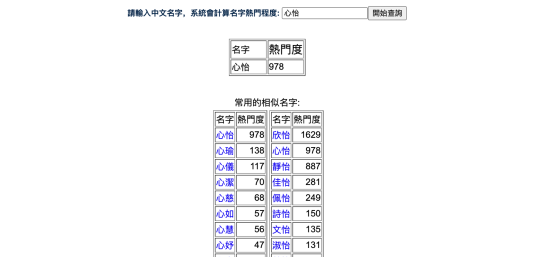
The default name when you click on the page is 心怡. This one is pretty popular. If you know you really want a name with the character 怡, you can enter in 怡怡 so it will show all the most popular names with this character (both in the first or second position), like below:
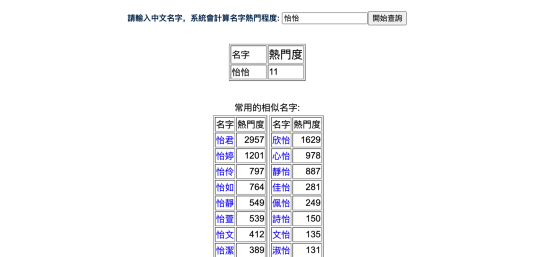
Some other pages of interest are the list of most popular characters in names (常用名字[單字]) and the list of most popular names (常見名字). You can click on each character or name to see more. According to the website, about 90% of names are made up of the top 500 most popular characters, and the 1000 most popular names made up 22% of people. So if you want a “normal” sounding name, this is a great resource. If you’re wondering, the most common character is apparently 怡, with the most popular name being 怡君!
Resource #2 NameChef
This site is available in English and Chinese, so it’s relatively accessible for people who don’t speak Chinese. However, some of the specific information on individual names is only in Chinese. Also, that it seems to default to displaying traditional characters when you are in English mode, so you may need to ensure you are entering traditional characters in some of the later steps.
First I’ll discuss the name generator. This feature is great because it allows you to specify a region (Mainland, Hong Kong, Macau, Taiwan, Singapore, Malaysia, or any). Different regions have different naming trends. I can’t vouch entirely for how good this feature is, but I think it’s so cool that they offer it.

Another cool feature is that you can specify different traits. I can imagine this would be great for those of you looking for a name for an original character. You can also skip this step if you don’t have a preference.

Next you can enter a surname and a character you want included in the given name. As you can see, you can pick to include a character but not specify placement, specify the first character, or specify the second character. This is also good for 字辈 or if you’ve selected a character you want to include but are not sure how to finish formulating the name.
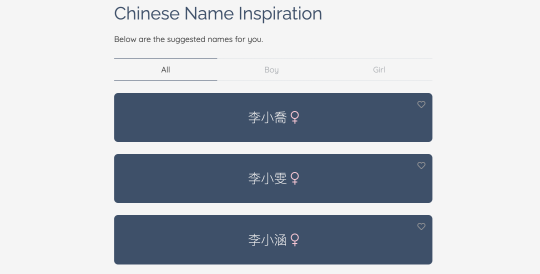
Here’s my list of names. It happens to just have female ones at the top, but since I’m on the “all” tab, it’s actually displaying a mix.
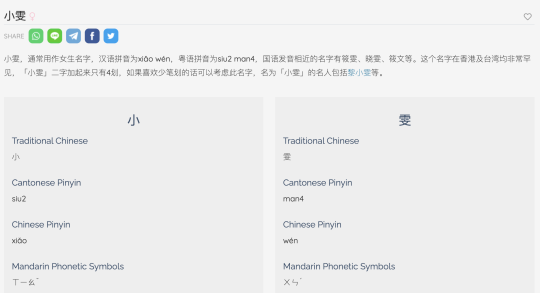
If you click on a name, you can see some more information. Further down, the page also shows stuff like gender, popularity of the name by region, and names with similar pronunciation. However, I noticed that the site isn’t the best at noting which names are more gender neutral, so this is something to keep in mind.
This site also has pages on popular namesandcharacters by region! I find this stuff very interesting. The lists definitely reflect some trends in names I’ve observed by region, so even though I don’t know the data source, it seems fairly accurate.

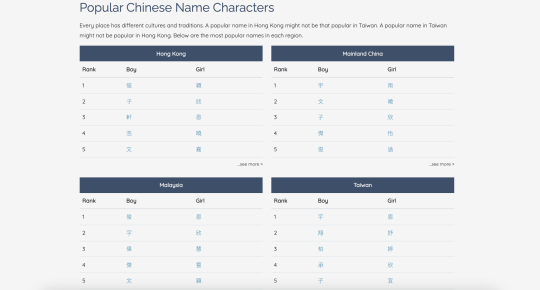
Resource #3: Provincial Databases (重名查询)
Some provinces have websites where you can enter names and see the number of people with the name. Sometimes they include a gender breakdown too. There is actually a government site for the whole country that does this, but I think you have to be a Chinese citizen to use it. Luckily, some of the individual provincial services don’t require this. There are probably more sites for other provinces, but I’m just going to list a few. Guangdong, Henan, and Shandong are the three biggest provinces in China, so those are always good ones to start with. These sites are all in Chinese.
- Shandong (city breakdown)
- Jiangsu (gender breakdown)
- Henan (search by whole province or city/county)
- Jiangxi (gender, age, and even astrological breakdown)
- Guangdong (gender breakdown)
- Liaoning (gender and city breakdown)
If you use one of these sites, first I recommend trying a super common name like 张伟 so that you can use that information to interpret your results. Also, I believe for all of these site you have to enter a surname, so you can just pick a common one like 王, 李, or 张 (or whatever the most prevalent surname is for that individual province).
I hope these resources are helpful to you! If you know of other good websites, I’d love to see them too.
Today I’m sharing 13 成语 that each contain all 4 tones (not counting the neutral tone). I just find them really cool for some reason. I either learned these 成语 in class or have encountered them online independently. Example sentences from Pleco.
重男轻女 zhòngnánqīngnǚ - lit. to value males and belittle females (idiom)
中国
我们不应该有重男轻女的观念。异口同声 yìkǒutóngshēng - different mouths, same voice / to speak in unison (idiom)
“没问题。”同学们异口同声地回答。班门弄斧 bānménnòngfǔ - to display one’s slight skill before an expert (idiom)
在你面前班门弄斧,太不好意思了。刻骨铭心 kègǔmíngxīn - lit. carved in bones and engraved in the heart (idiom) / fig. etched in one’s memory / unforgettable
父母对子女的爱,是如此的刻骨铭心。装聋作哑 zhuānglóngzuòyǎ - to play deaf-mute / to feign ignorance
他装聋作哑,说他一点也不知道。南腔北调 nánqiāngběidiào - to speak with a mixed accent
他讲话南腔北调的。胡思乱想 húsīluànxiǎng - to indulge in flights of fancy (idiom); to let one’s imagination run wild
你要是以为自己可以获胜的话,一定是在胡思乱想!海枯石烂 hǎikūshílàn - lit. when the seas run dry and the stones go soft (idiom) / fig. forever / until the end of time
我爱你到海枯石烂。寒风刺骨 hánfēngcìgǔ - bone chilling wind (idiom)
在寒风刺骨的夜里,街上安安静静的。生儿育女 shēng'éryùnǚ - to bear and raise children
他们决定开始生儿育女。言之有物 yánzhīyǒuwù - (of one’s words) to have substance
这篇文章言之有物。举足轻重 jǔzúqīngzhòng - a foot’s move sways the balance (idiom); to hold the balance of power / to play the decisive role
她在政府中的作用举足轻重。以防万一 yǐfángwànyī - to guard against the unexpected (idiom); just in case / prepared for any eventualities
也许不会下雨,不过还是带把伞,以防万一。
I wanted to update this post with some additional 成语. Some of them have been featured on my blog before (mostly from one of my 50 成语 posts hereandhere), but I thought it would be nice to have them collected altogether.
多管闲事 duōguǎnxiánshì - meddling in other people’s business
现在我了解情况了,真希望自己当初没去多管闲事。
步履蹒跚 bùlǚpánshān | bùlǚmánshān - to walk haltingly / to hobble along
那位老太太步履蹒跚地走下楼梯。
My Chinese teacher said this chengyu can also be pronounced bùlǚmánshān.
淡然处之 dànránchǔzhī - to treat indifferently or coolly
面对困难,他淡然处之。
无懈可击 wúxièkějī | wúxièkějí - invulnerable
需要更多证人让案子无懈可击。
In Taiwan, 击 is pronounced jí, so this 成语 wouldn’t fit the all 4 tones requirement.
庸人自扰 yōngrénzìrǎo - to get upset over nothing / to make problems for oneself
事情已经解决,你就别庸人自扰了。
举世无双 jǔshìwúshuāng - unrivaled / world number one / unique / unequaled
他表演的冰上舞蹈真是举世无双。
明目张胆 míngmùzhāngdǎn - openly and without fear / brazenly
小偷明目张胆地开偷来的车。
火上加油 huǒshàngjiāyóu - to add oil to the fire / to aggravate a situation / to enrage people and make matters worse
他心情不好,别火上加油。
提心吊胆 tíxīndiàodǎn - to be very scared and on edge
我对考试结果感到提心吊胆的。
天旋地转 tiānxuándìzhuàn | tiānxuándìzhuǎn - the sky spins and the earth goes round / giddy with one’s head spinning / huge changes in the world
我一站起身就觉得天旋地转。
This 成语 can be pronounced with zhuàn (Mainland) or zhuǎn (Taiwan). Obviously it only contains all 4 tones with zhuǎn.
倾盆大雨 qīngpéndàyǔ - a downpour / rain bucketing down / to be overwhelmed
倾盆大雨让地面湿透了。
天理不容 tiānlǐbùróng - heaven cannot tolerate this / intolerable behavior
对于她来说,这种行为简直天理不容。
奇货可居 qíhuòkějū - rare commodity worth hoarding / object for profiteering
他们把票子当做奇货可居。
There are 15 total tone orders present out of 24 possibilities (4 * 3 * 2 *1). Which orders are included? Let’s look!
6 成语: 1243
3 成语: 2143, 4321
2 成语: 2134, 2431
1 成语: 1324, 1342, 2413, 3124, 3214, 3241, 3412, 3421, 4213, 4231
I thought it was very interesting that 1243 led by quite a bit! I totally did not notice as I was drafting this post. But this is just a small sample, so it isn’t necessarily representative of all 成语.
Jess Lee is nicknamed 铁肺女王 (iron lung queen), and this song perfectly demonstrates why. She hasn’t been in the industry as long as Tanya Chua and Stefanie Sun (the last two artists I’ve featured in this series), but I’ve found some real gems on her 4 albums. This song is her most popular and not too difficult in terms of vocabulary content. Probably the most difficult part of the song is that there are some long pauses between words that can make the lines hard to parse. The song is quite sad lyrically, but it stands out most as being dramatic and powerful. It’s not like your typical sad love song in that way. And the title is very fitting, because I really feel the torment and suffering from Jess Lee’s performance.
李佳薇 (Jess Lee) - 煎熬
早知道 你只是飞鸟
拥抱后 手中只剩下 羽毛
当初你又何必浪费
那么多咖啡和玫瑰 来打扰
飞鸟 fēiniǎo - bird
羽毛 yǔmáo - feather / plumage / plume
我想要 安静的思考
天平上 让爱恨不再 动摇
一想你就平衡不了
我关灯还是关不掉 这风暴
天平 tiānpíng - scales (to weigh things)
动摇 dòngyáo - to sway / to waver / to rock / to rattle / to destabilize / to pose a challenge to
风暴 fēngbào - storm / violent commotion / fig. crisis (e.g. revolution, uprising, financial crisis etc)
心一跳 爱就开始煎熬
每一分 每一秒
火在烧 烧成灰有多好
叫思念 不要吵
我相信我已经快要
快要把你忘掉
跟寂寞 再和好
和好 héhǎo - to become reconciled / on good terms with each other
得不到 也不要乞讨
怎么做 不需要别人 转告
在陷得太深的海底
我也只剩下我自己 能依靠
乞讨 qǐtǎo - to beg / to go begging
转告 zhuǎngào - to pass on / to communicate / to transmit
陷 xiàn - pitfall / trap / to get stuck / to sink / to cave in / to frame (false charge) / to capture (a city in battle) / to fall (to the enemy) / defect
海底 hǎidǐ - seabed / seafloor / bottom of the ocean
心一跳 爱就开始煎熬
每一分 每一秒
火在烧 烧成灰有多好
叫思念 不要吵
我相信我已经快要
快要把你忘掉
跟寂寞 再和好
我相信我已经快要
是真的我快要
快要可以微笑
去面对 下一个 拥抱
This is a followup to my post Chinese Surnames You Might Be Pronouncing Wrong, but now the focus is on given names. Technically, some of the characters below can be surnames, but they’re uncommon, so you will likely encounter them given names more than as surnames. Most of the characters below have multiple pronunciations, and their typical pronunciations as part of a given name might not be what you’re accustomed to. So let’s begin!
兴 - Like me, you probably first encountered this character in words like 高兴 and 兴趣. But then I learned the word 兴奋…and here it’s xīng not xìng!!! 兴 with the first tone can be a surname, but it’s rare. But you will definitely encounter it in given names.
Example: 周兴哲 (Zhou Xingzhe/Eric Chou)
一 - You have probably read about tone changes for this character that result in it being pronounced yì or yí. This also applies to names! It becomes yì before 1st/2nd/3rd tone, becomes yí before 4th tone, and remains yī at the end.
Examples:
Idol and actor 王一博 (Wang Yibo) ← before 2nd tone
SIS member/TCO3 contestant 洪一诺 (Hong Yinuo) ← before 4th tone
Singer/Produce Camp 2019 contestant 李鑫一 (Li Xinyi) ← end
少 - We all know shǎo. But do you shào as in 少年, 少女, 少林, etc.? Now you do. When 少 is used in names, I’ve only ever heard it pronounced shào.
Example: Actor 余少群 (Yu Shaoqun)
乐 - This one is kinda complicated. First we have 快乐的乐 and 音乐的乐. Both pronunciations can be surnames, but they are not so common (Baike says Yuè is more common). When this character is used in given names, I’ve only heard it pronounced lè. But there could be someone out there who says it as yuè.
Example: NCT member 钟辰乐 (Zhong Chenle)
茜 - This character can be pronounced xī or qiàn. It seems qiàn is the standard pronunciation for names. According to MDBG, the xī pronunciation is used in transliterated names. Interestingly, I noticed while watching the Olympics that gymnast 唐茜靖 is Tang Xijing and not Qianjing, but looking at her Baike entry seems to confirm that xī is not the standard pronunciation in names.

Example: Actress 万茜 (Wan Qian)
燕 - 1st tone Yān is a surname, but it’s not that common. 4th tone yàn is what you’ll find in given names.
Example: Singer 孙燕姿 (Sun Yanzi/Stefanie Sun)
柏 - This character in given names, in my experience, is always bó. The character can also be pronounced bǎi in Mainland China, and Bǎi can be a surname. But in Taiwan, it’s always pronounced bó (according to MDBG).
Example: Singer/Rapper 潘玮柏 (Pan Weibo/Wilber Pan)
蔚 - Apparently this character can be the surname Yù, but it’s not a very common surname, so I’ve only been exposed to this character in the word 蔚蓝 and in names. In these cases, it’s pronounced wèi.
Example: Singer 莫文蔚 (Mo Wenwei/Karen Mok)
露 - By now you may have noticed that a lot of characters can be surnames (but are pretty rare). This is one of these characters as well. It can be pronounced lòu or lù. Lù is the pronunciation as a surname and in given names.
Example: Actress 赵露思 (Zhao Lusi)
为 - I’m sure I’m not the only one who sometimes gets a headache over how to pronounce this character. It’s not hard to remember the difference in meaning between wéi and wèi, but sometimes in the middle of long, complex sentences, I have trouble telling which pronunciation/meaning is being used until the end of the sentence. Anyway, in names, this character is typically pronounced wéi.
Example: Actor 佟大为 (Tong Dawei)
强 - You are probably aware that this character has multiple different readings/meanings. The most common is probably qiáng, but I encounter qiǎng a lot too (poor jiàng is rare), so I thought this character was worth including. In names, it is pronounced qiáng. This becomes pretty clear when you think about the difference in meaning between the two pronunciations.
Example: Chinese premier 李克强 (Li Keqiang)
媛 - This character has two readings, yuán and yuàn. The two meanings are also similar, with both relating to beauty. In names I have only ever heard the yuán pronunciation. 媛媛 is itself a fairly common name.
Example: Wife of Xi Jinping, 彭丽媛 (Peng Liyuan)
靓 - This one is tricky. The character can be pronounced liàng or jìng. I wasn’t able to find a definitive answer about how it is usually pronounced in names. However, I noticed in a cross-strait dictionary that for several words that use the liàng pronunciation in Mainland China, the jìng pronunciation is used in Taiwan. I found several Taiwanese actors/singers with 靓 in their names, and they all appeared to use the jìng pronunciation. Also, I have read that several words pronounced with liàng in Mainland China are borrowed from Cantonese. So, if you meet someone from Taiwan with this character in their name, it’s probably pronounced jìng. If you meet someone from Mainland China, I would guess liàng. But be prepared to be mistaken just in case.
Examples:
Singer 张靓颖 (Zhang Liangying/Jane Zhang)
Actress 阳靓 (Yang Jing/Peace Yang)
Now for a few some cross-strait differences!
妮 - This character can be found in female given names. In Mainland China it is pronounced nī; in Taiwan it is ní.
Example: Actress 倪妮 (Ni Ni)
薇 - This character is used in a lot of female names too. Like the similar character 微, this character is pronounced wēi in Mainland China but wéi in Taiwan.
Example: Actress 赵薇 (Zhao Wei)
夕 - I mentioned this character in my post about characters pronounced differently in Mainland China and Taiwan. It is xī in Mainland China and xì in Taiwan.
Example: Acclaimed songwriter 林夕 (Lin Xi)
汐 - You can probably guess from the character above how this character is pronounced. Yep, it’s xī in Mainland China and xì in Taiwan.
Example: Actress 任素汐 (Ren Suxi)
锡 - This character is pronounced xī in Mainland China but pronounced xí in Taiwan.
Example: Global Times Editor-in-Chief 胡锡进 (Hu Xijin)
I’m trying to post more this summer, so here’s another Mandopop vocab list. I’ve seriously been seeing some of these words pop up EVERYWHERE. I guess it’s the Baader–Meinhof phenomenon?
- 姿态 zītài - attitude / posture / stance
我们都讨厌她傲慢的姿态。 - 不知不觉 bùzhībùjué - unconsciously / unwittingly
不知不觉已过了三个月。 - 暧昧 àimèi - vague / ambiguous / equivocal / dubious
她与一个已婚男人的关系有些暧昧。 - 放纵 fàngzòng - to indulge / to pamper / to connive at / permissive / indulgent / self-indulgent / unrestrained / undisciplined / uncultured / boorish
我们偶尔都会放纵一下自己。 - 背叛 bèipàn - to betray
这种背叛严重伤害了我。 - 牵挂 qiānguà - to worry about / to be concerned about
好好学习,家里的事不用牵挂。 - 优先 yōuxiān - to have priority / to take precedence
我总是优先考虑我的孩子们。 - 忍耐 rěnnài - to endure / to bear with / to exercise patience / to restrain oneself / patience / endurance
我的忍耐是有限度的。 - 漫无目的 mànwúmùdì - aimless / at random
他过着一种漫无目的的生活。 - 闪烁 shǎnshuò - flickering / twinkling / evasive / vague (of speech)
她的眼睛里闪烁着喜悦的泪花。 - 坦白 tǎnbái - honest / forthcoming / to confess
坦白地说,我根本不在乎。 - 不配 búpèi - unworthy / unsuitable / not fitting
这袜子的颜色和鞋子不配。 - 退路 tuìlù - a way out / a way to retreat / leeway
我们到了没有退路的地步。 - 脸孔 liǎnkǒng - face
我还记得那些名字、那些脸孔。 - 不闻不问 bùwénbúwèn - to show no interest in sth / uncritical / not in the least concerned
她对这件事情完全不闻不问。 - 空白 kòngbái - blank space
我脑子突然一片空白。 - 标本 biāoběn - specimen / sample / the root cause and symptoms of a disease
苏州园林是中国园林的标本。 - 坐立不安 zuòlìbùān - agitated sitting or standing / restless / fidgety
都半夜了,儿子还不回家,母亲坐立不安。 - 无所事事 wúsuǒshìshì to have nothing to do / to idle one’s time away
孩子在家一整天都无所事事。 - 着迷 zháomí - to be fascinated / to be captivated
老爷爷的故事让孩子们听得着迷了。
These words are so fun to me! They are truly just fun to say. There are also A TON of words with this ABB pattern, so I’m only listing 20 that I’m familiar with. Please enjoy them :)
- 空荡荡 kōngdàngdàng - absolutely empty / complete vacuum
- 孤零零 gūlínglíng - lone / isolated and without help / all alone / solitary
- 毛茸茸 máorōngrōng or máoróngróng - hairy / shaggy
- 肉乎乎 ròuhūhū - plump / fleshy
- 阴森森 yīnsēnsēn - gloomy / gruesome / ghastly
- 热腾腾 rèténgténg or rètēngtēng - steaming hot / bustling / hectic / excited / stirred up
- 阴沉沉 yīnchénchén - dark (weather, mood)
- 香喷喷 xiāngpēnpēn - delicious / savory
- 空洞洞 kōngdòngdòng - empty / deserted
- 赤裸裸 chìluǒluǒ - bare / naked / plain / undisguised / unadorned
- 笑盈盈 xiàoyíngyíng - smilingly / to be all smiles
- 眼睁睁 yǎnzhēngzhēng - to stare blankly / to look on helplessly / to look on unfeelingly
- 笑嘻嘻 xiàoxīxī - grinning / smiling
- 甜蜜蜜 tiánmìmì - very sweet
- 黑乎乎 hēihūhū - black / blackened / dark / dim / blurry
- 绿葱葱 lǜcōngcōng - green and luxuriant
- 急匆匆 jícōngcōng - hurried / hasty
- 笑眯眯 xiàomīmī - beaming / all smiles
- 湿淋淋 shīlínlín - dripping wet / drenched
- 光闪闪 guāngshǎnshǎn - shiny / gleaming / brilliant
